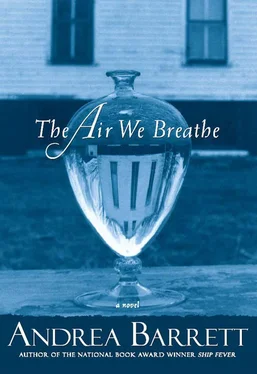IT WAS ON a Wednesday that Dr. Petrie met with Miles; Leo returned to his room on Friday, the same day Miles told Dr. Richards he’d completed his investigation. On Saturday Miles went to the meeting with Mrs. Martin, after which nothing changed. Sunday, Monday, Tuesday passed, during which the news of Miles’s retreat spread throughout Tamarack State. We might have welcomed Leo back then: but still nothing changed. He confided in no one; he told none of us the story he’d told Eudora about Ephraim’s visitor and the box he’d left behind. Twice he walked to the clearing by himself, looking over the new stones that marked where Morris and Edith and Denis lay, and this seemed to us to signal something suspicious. By then, perhaps it wouldn’t have mattered what he’d done. We no longer trusted him.
None of us slept during our afternoon rest hours that next Wednesday, the balconies so hot beneath the canvas awnings that we could feel ourselves shriveling, and when four o’clock arrived we leapt from our cure chairs and headed toward the pavilion. Even here there was only the smallest breeze, but this, combined with the shade of the pavilion roof, the smell of the cedar shakes, and the sight of the creek emptying sluggishly into the weedy mouth of the nearest pond, was still a relief. No one was feeling well. Six patients were in the infirmary Leo had so recently left; there’d been three dramatic hemorrhages in the last four days and no one had any appetite. Twice the afternoon milk had curdled. Our hearts seemed curdled as well. We sat on the pavilion benches or the balcony rails, fanning ourselves with copies of The Kill-Gloom Gazette while Leo paced slowly back and forth between the willow tree at the top of the pond and the three larches clustered at the first bend in the creek.
He looked, Polly remarked, as if he were attached to a pendulum. Back and forth, back and forth, thinking intently while we drooped in the shade. How long would he do this? Ian wondered. And what was he thinking about?
Us, we knew. We’d been behaving badly. Overhead a swarm of sparrows pulled tightly together only to scatter, as if even they were too warm to be near each other.
He felt, he was thinking as a larch cone crunched beneath his feet, like a stranger. A stranger to us. In the dining room he felt more alone than he had a year ago, when, during a similar heat wave, Ephraim had first wheeled him through the door of the old hall. Then we had welcomed him; now we were polite. Always, but only, polite. We never accused him of anything. Yet if he walked up to Pietr and Zalmen and Lydia and Bea and tried to join their conversation, he felt his words slide into nothingness as he spoke. If he suggested to Abe and Ian that they read a book together and discuss it, they smiled, spoke vaguely of being busy, and moved away. David and Pearl and Celia had separately offered excuses when he’d proposed walks to them; even Kathleen turned from him, although she blushed as she did. We’d all evaded him, our eyelids lowered and our real thoughts shrouded. None of us offered more than courtesy demanded and no one would say — we could not, exactly, have said — what he’d done wrong. We thought of the library books Miles’s agents had earlier carried away in boxes, and of the orders to darn worn sheets instead of replacing them, change the linens less often, reuse rags that should have been burned. It’s our duty to economize, Dr. Richards had told both the staff and us: but we sensed Miles behind the new directives. Miles, reaching for Leo, punishing us.
As Leo paced, a young fox popped up from the grass, snapping at a butterfly that lifted effortlessly just out of reach. He stopped, watched, and then watched us watching the fox, while ignoring him. If he’d known for sure how Eudora felt, perhaps he wouldn’t have panicked, but he’d seen little of her since leaving the infirmary. He couldn’t read her intentions any more clearly than he could read ours, and he wondered, now, if she’d really heard what he was saying when he’d asked her to the movies. He wasn’t sure anymore why she’d come that night, or what might have happened between them without the fire. Apparently they were going to have to start all over again.
A handful of sparrows, one missing a foot, landed on the dusty path, and he glanced over at us again. Clumsily, obdurately, we looked away while Otto, feeling guilty because of Naomi’s letter, turned his back completely. For more than a month that letter, stalled at first by her careless address and then by the chaos after the fire, had lain in the village post office with the other mail meant for here. Once the sacks were finally delivered and all the mail was sorted through, Otto had seen the envelope addressed to Leo and, well-intentioned then, had taken it back to their shared room, to deliver when Leo returned. After the humming started, though, he’d hidden it on purpose. “Not my fault,” he’d said blandly, when he finally decided to deliver it: already that line embarrassed him. “I stuck it in a book and then forgot about it.” And so it was only on the night before we gathered at the pavilion that Leo had read:
May 9, 1917
Leo—
I don’t know why I’ve been so stupid. You were doing everything possible to let me know and still I missed all the signs. In your room that afternoon, you signaled me again — I saw the way you avoided my face so carefully. The way you closed the door behind us, your right hand wrapped around the edge, showing me your fingers until the last minute. Your shirt collar opened so I could see the pulse at the base of your throat—
I used to think I knew what longing was but I was wrong. You’re with me everywhere, all the time. The birds are you, the foxes are you, the plants pushing up beneath the trees and the trees themselves, trunks and branches, from the smallest needle to the roots spreading through the ground. The curtains in my mother’s house and the silverware in the drawers. Everything. What we feel for each other, the way we’re intertwined — I can feel everything you mean to say to me, you don’t need to say a word. It means nothing that you are sick. Nothing. You’ll be well as soon as we’re together, away from here; I’m healthy enough for both of us and my strength will flow into you.
Meet me this Friday at the movies. Sit near the back and wait for me, I have to take Miles someplace but then I’ll come to you. I have something to give you, something of yours, which I’ve been holding on to for too long; that was my mistake, but I know you’ll forgive me and then we can make a plan. I have the car, I know a place where we can stay. I have money enough for our journey. All we need to do is pick the day and we can leave our old lives behind.
Love, Naomi
He remembered Eudora’s trusting glance the afternoon she’d been in his room, and the way she’d looked toward him for help. He’d hardly noticed Naomi and yet she’d apparently studied his every move. The idea of her drawing his face again and again, and then writing that letter and sitting beside him, made his skin crawl as if insects were marching up and down in rows. He gazed longingly across the meadow at the staff cottages. Irene, who lived in one of them, might have helped him sort through his confusion. But she’d already done so much by writing to Dr. Richards on his behalf that he felt ashamed to trouble her again.
In the west clouds were gathering, weather moving in from Canada. We turned our faces to the breeze and saw Leo, perhaps unconsciously, turn his head as well. He stopped in the middle of his circuit, halfway between the clump of larches — larch, we’d learned years ago, was another name for tamarack — and the willow. Miles, he was thinking, didn’t really believe that he was innocent; he was pushing the rest of us as a way of getting at him. In fact as that breeze touched our faces we were discussing another of Miles’s intrusions: the arrival, that Monday night, of our own personal Four-Minute Man. Everywhere else in the country, Miles claimed, these volunteers were giving pep talks in theaters and churches, inspiring audiences to buy Liberty Bonds, plant victory gardens, conserve food, work longer hours, economize on coal. Surely we needed this more than most; why not set aside a dinnertime slot once a week, and let a series of these punchy speakers inspire us while we ate? Dr. Richards had agreed, perhaps to placate him, and so along with our baked macaroni and cheese we’d been served with a barrel-chested man, standing on a chair and chattering at auction speed for the time it would have taken to change reels, if we’d been watching a film.
Читать дальше












